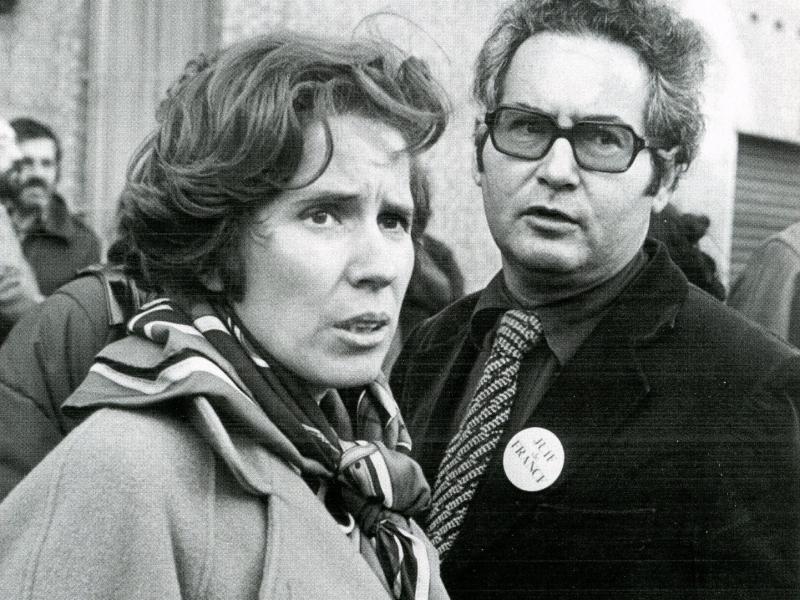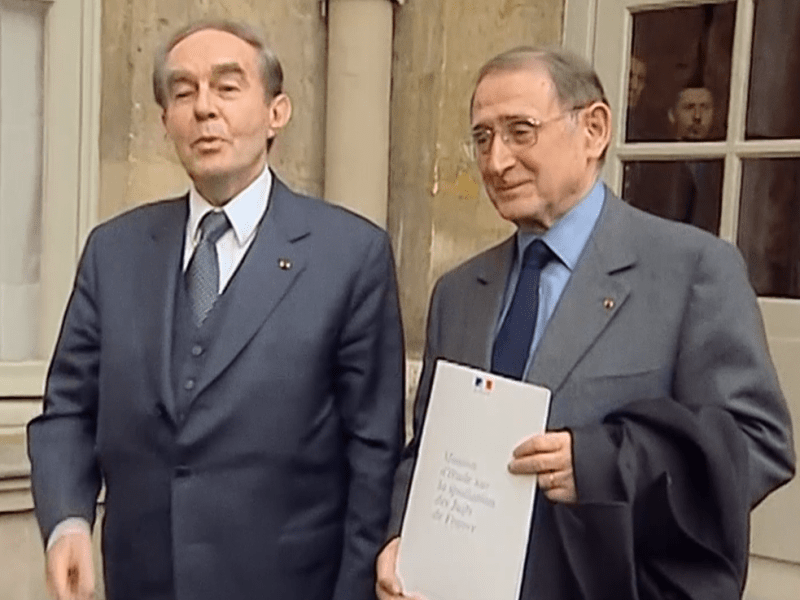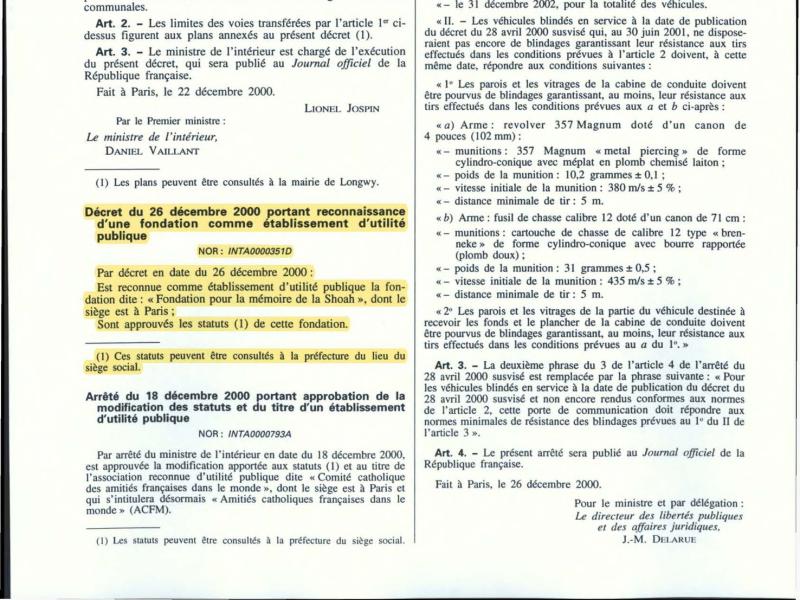Our history
The Foundation for the Memory of the Shoah was created in 2000, by decree of the French government, in a context marked by the awareness of the responsibility of the French State in the genocide of the Jews.
It was designed to transmit and disseminate knowledge relating to anti-Semitic persecutions and human rights abuses committed during the Second World War. From its creation, its missions have included solidarity with Holocaust survivors, the preservation of Jewish culture that the Nazis attempted to annihilate, and the dissemination of knowledge relating to other genocides. Since 2015, it has also supported projects combating anti-Semitism and promoting intercultural dialogue.
A private foundation recognized as being of public utility, born from a rare political consensus, it carries a peaceful memory: that of the Shoah but also that of other genocides, far from any memorial competition.

Serge and Beate Klarsfeld in the 1970s - Photo Charles Tremil
1945-1995: the construction of a memory of the Shoah
During the years following the end of the Second World War, the specific fate of the Jews was not taken into account. The words of the survivors of the Shoah exist but are little listened to, the memory of the deportation then being dominated by that which struck the resistance fighters and the political deportees: it is then a question of allowing national reconciliation by glorifying the heroes, and by making of Vichy a simple parenthesis of French history.
From the 1970s, the specific fate reserved for the Jews was gradually recognized as such by the general public, thanks to the combined work of witnesses, historians, and memory associations.
In 1978, lawyer Serge Klarsfeld published The Memorial of the Deportation of Jews from France, drawn up from the list of deportees, classified by convoys.
The 1970s-1980s were marked by a renewal of historiography relating to the Vichy regime and collaboration, and to the involvement of the French state in the fate of the Jews.
In 1985, the release of the film "Shoah" by Claude Lanzmann, composed entirely of testimonies, had an exceptional impact. Its title now designates, for the general public, the genocide of the Jews.
At the same time, the major trials, against Klaus Barbie (1983-1987) and Maurice Papon (1997-1998) in particular, allowed witnesses to recount in court the crimes suffered by Jews during the Second World War. They still stir up controversies concerning the responsibility of the French state in the persecution of the Jews.
Signs explaining the Vél d'Hiv Roundup in the nearby metro station - Photo FMS
1995: recognition of the responsibility of the French State in the Shoah
On July 16, 1995, during the commemorations of the Vélodrome d'Hiver roundup, Jacques Chirac, just elected President of the Republic, publicly recognized the responsibility of the French State in the Shoah:
These dark hours forever stain our history and are an insult to our past and our traditions. Yes, the criminal madness of the occupier was, everyone knows, seconded by the French, seconded by the French state. (…) Transmit the memory of the Jewish people, the suffering and the camps. Testify again and again. Recognize the mistakes of the past and the mistakes committed by the State. Not obscuring anything from the dark hours of our history is quite simply defending an idea of man, his freedom and his dignity. It is fighting against the dark forces, always at work.
50 years after the end of the war, the Vel’ d’Hiv’ speech marks a major political turning point. This solemn declaration opens the way to other symbolic gestures. The action of the public authorities is being strengthened to see aspects hitherto absent from the national memory recognized, whether it is the role of the Vichy regime in the persecution of the Jews or the rescue action of the Righteous People of France.

Jean Mattéoli and Ady Steg, vice-chairman of the commission, holding the Mattéoli report - Extract from Isabelle Wekstein's film about Ady Steg
1997-2000 : the creation of the Foundation for the Memory of the Shoah
It is in this context that in March 1997, Prime Minister Alain Juppé entrusted Jean Mattéoli, former resistance fighter and president of the Economic and Social Council, with the direction of a study mission on the dispossession of the Jews of France in 1940 to 1944.
Made up of historians and qualified personalities, the Mattéoli Commission is responsible for studying the scale and extent of this spoliation, and the restitution measures adopted after the war. It must also make proposals on the fate of unreturned property.
On April 17, 2000, Jean Mattéoli presented the conclusions of this work to Prime Minister Lionel Jospin. The general report of the Mattéoli mission demonstrates that although the restitution carried out after the Second World War was important, it remained incomplete. And insists on the importance of memory work, concluding:
The material aspects of the dispossession of the Jews of France and the restitution are certainly crucial, but they do not constitute the essential part. Before being a matter of money, spoliation was a persecution whose end was extermination. No story will convey what men and women experienced daily, with its weight of anguish, humiliation and misery. Of course, this is the lot of all wars and others have also suffered. But this was not in application of discriminatory laws and regulations which removed them from the national community simply because of their birth. This is an unprecedented exception which it is up to us to ensure is never repeated.
The recommendations of the Mattéoli mission led to the creation of a Commission for Compensation for Victims of Spoliation (CIVS), responsible for examining individual requests for compensation, and of the Foundation for the Memory of the Shoah. The escheated funds of all kinds resulting from the spoliation will be paid to the latter by the public and private institutions concerned. The Foundation's initial endowment thus amounts to 393 million euros.

Decree of 28 December 2000 recognising a foundation - extract from the JO
Since 2000: a mission of history, education and solidarity
The Foundation for the Memory of the Shoah was officially created by decree of the French government on December 26, 2000.
Its birth marks a major step in the consolidation of the memory of the Shoah in France. Chaired by Simone Veil then, since 2007, by David de Rothschild, et at least, since July 2023 by Pierre-François Veil, it is administered by representatives of public authorities, major Jewish institutions and by qualified personalities.
A private foundation recognized as being of public utility, it must contribute to the development and dissemination of knowledge on anti-Semitic persecutions and on the victims of these persecutions, and on the conditions which allowed the vast majority of Jews in France to escape from the deportation.
It also has an important solidarity mission, supporting, in particular, initiatives to provide moral, technical or financial support to those who have suffered from this persecution.
The recommendations of the Mattéoli mission also emphasize the preservation and transmission of Jewish culture, entire sections of which were destroyed during the Shoah.
Reflection on the mechanisms and sources of hatred being considered essential, the purpose of the Foundation was quickly extended to research on other genocides or crimes against humanity.
At the end of 2014, a new commission was created specifically responsible for the fight against anti-Semitism and the promotion of intercultural dialogue.
Since its creation, more than twenty years ago, the Foundation distributed €390M to 5,500 projects.









